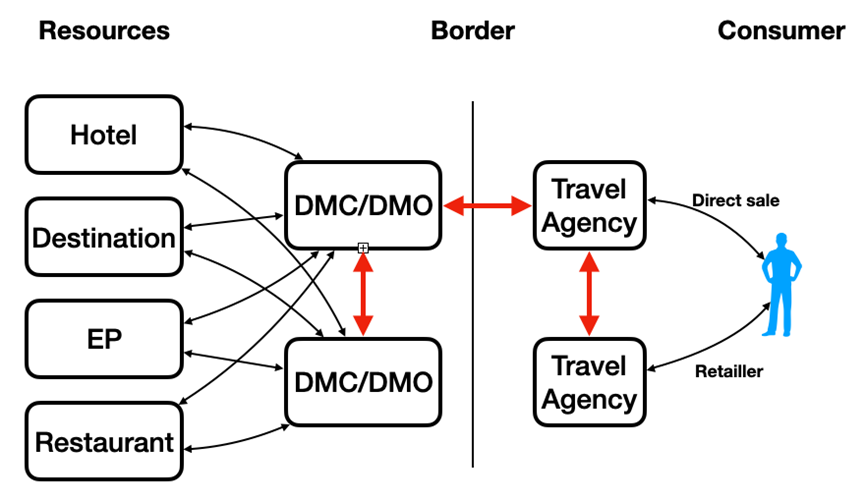Travel Agency and DMC API RDM
back to
Project Details
“Package Tour” has been the most popular way of travel in the past century, Hundreds of thousands travel agencies and Destination Managing Company (DMC) and Destination Managing Organization (DMO) are servicing travelers in this industry, since Internet was invented, big OTAs (Online Travel Agency) are prominent in the industry, using IATA airline standards, and OTA (Open Travel Alliance) hotel booking standards, traditional travel agencies and DMCs/DMOs are being left behind at this Internet travel trend, because they don’t have a sector relevant standard for exchanging data between each other. In this OTA era, people tend to travel FIT (Free Individual Traveler), but the fact is distinctions suitable for FIT is limited by security condition, transportation convenience condition and language barrier etc, the result for FIT is finally most travelers stay in big city, because OTAs are only “matching platform” for traveler and travel resources. The opportunity and requirement are for Travel Agency coordinating with DMCs can provide service and knowledge added value to design better itinerary and bring travel to wider choice of destinations. Before actual travel occur, the product in travel industry is only “information”, no physical products exist, and most of travel agencies and DMCs are small and medium business entity where currently no open standards exit. Currently the big OTAs are all making their own API rules them self, without a global API standard, OTAs connecting each other by using all different API standards are very big and expensive task already. Without recognized open standards SME MSME travel agencies are inhibited from contributing to the industry. The small Travel Agencies to develop software to connect to different OTAs by different API standards is nearly mission impossible, open global standards as produced by UNECE-UN/CEFACT and the purpose of this project will overcome this challenge. The challenge facing the SME travel Agency is the same os faced by SME’s in global trade of goods. UNECE-UN/CEFACT mission is to produce standards bridging the gap between large corporate bespoke platforms and SME engagement in the industry. The purpose of this project is to design a set of API standard for exchanging “Itinerary”,“Quotation”, “Package Tour”, “Traveler”, and “Review” data between for travel agencies (including traditional travel agencies and OTAs), between travel agencies and DMCs, and between DMC to DMCs. The project enables replacing the current emails and spreadsheets used to exchange tour package data between Travel Agencies (mostly SME’s) and Destination Managing Company (DMC) and Destination Managing Organization (DMO) with harmonized data and comments. (Ref red arrows in the diagram below). This will deliver additional semantic data definition into the CCL, RDM establishing the ability to write standardized APIs. The project enables replacing the current emails and spreadsheets used to exchange tour package data between Travel Agencies (mostly SME’s) and Destination Managing Company (DMC) and Destination Managing Organization (DMO) with harmonized data and comments. (Ref red arrows in the diagram below). This will deliver additional semantic data definition into the CCL, RDM establishing the ability to write standardized APIs.The project is to produce definitions and Reference Data Models (RDM) on Travel Agency, Destination Managing Company (DMC) and Destination Managing Organization (DMO) API. It does not deliver a certification system but it provides elements upon which certification or labeling systems could be build.The project will also deliver components of future recommendations to government to facilitate, promote Travel Agency, Destination Managing Company (DMC) and Destination Managing Organization (DMO).The project will take in consideration work which has been produced by UN/CEFACT on White Paper on the technical applications of Business Standards for Sustainable Tourism being a subset of sustainable tourism products. ITEMS:Project Purpose
Project Scope
PHASES:
Project Deliverables
Deliverable 1: A Reference Data Models (RDM) of and APIs specifications to cover the travel agency, Destination Managing Company (DMC) and Destination Managing Organization (DMO).
Deliverable 2: The other related Reference Data Models (RDM) and API specifications developed and information involved.
Exit Criteria
Exit Criteria for Deliv. 1: Approval by the Bureau of the Reference Data Models (RDM) and API specifications produced by the project team
Exit Criteria for Deliv. 2:
Project Team Membership and Required Functional Expertise
Membership is open to UN/CEFACT experts with broad knowledge in the area related as: Travel and tourism, both from supplier side and consumer side of tourism product. In depth knowledge of UN sustainable development goals.
In addition, Heads of Delegations may invite technical experts from their constituency to participate in the work.
Experts are expected to contribute to the work based solely on their expertise and to comply with the UN/CEFACT Code of Conduct and Ethics and the policy on Intellectual Property Rights.
Geographical Focus
The geographical focus of the project is global.
Initial Contributions
The following contributions are submitted as part of this proposal. It is understood that these contributions are only for consideration by the Project Team and that other participants may submit additional contributions in order to ensure that as much information as possible is obtained from those with expertise and a material interest in the project. It is also understood that the Project Team may choose to adopt one or more of these contributions “as is”
- White Paper on the technical applications of Business Standards for Sustainable Tourism
- UN SDG’s
Resource Requirements
Participants in the project shall provide resources for their own participation. The existence and functioning of the project shall not require any additional resources from the UNECE secretariat.
Project Proposal Files


